John and Matthew are watching every single live-action film starring Meryl Streep.
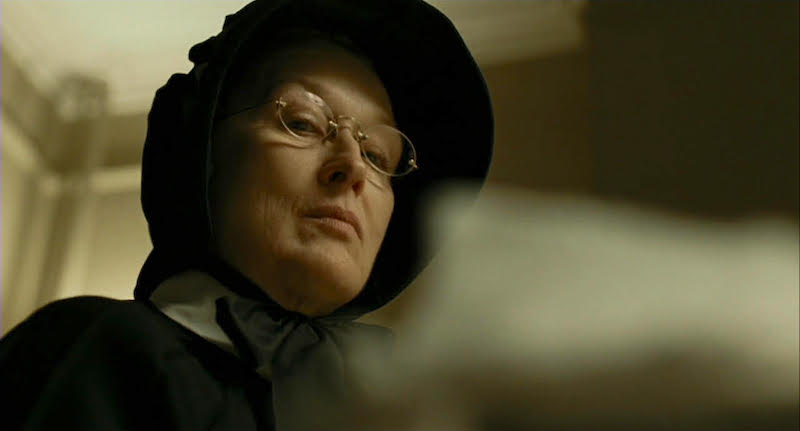
#40 —Sister Aloysius Beauvier, a nun and Catholic school principal who wages battles with a suspicious new priest.
JOHN: Arriving at John Patrick Shanley’s 2008 film adaptation of his Pulitzer Prize-winning play Doubt felt like stumbling upon a waterfall in the desert. After a fallow period marked by smallish, adequate performances in dull-to-dreadful films, Meryl Streep finally inherited a meaty, challenging role in a tony adaptation well worth her time and talent, and alongside fellow acting titans at that.
In Doubt, it is 1964, and Sister Aloysius Beauvier (Streep) is the harsh and unforgiving principal of a Catholic school in the Bronx. Feared by most students and routinely respected by her fellow nuns, especially the younger, guileless Sister James (Amy Adams), Sister Aloysius comes to believe that a heinous crime has been perpetrated under her roof...
Sister James informs Aloysius that the affable new priest Father Flynn (Philip Seymour Hoffman) might be inappropriately involved with her student Donald Miller (Joseph Foster II), the first and only black student to be admitted into their school. Flynn phones James during class to ask for Donald to meet with him alone in the rectory; Sister Aloysius is immediately convinced of Flynn’s untoward advances on the child and becomes determined to prove his misconduct and expel him from the parish.
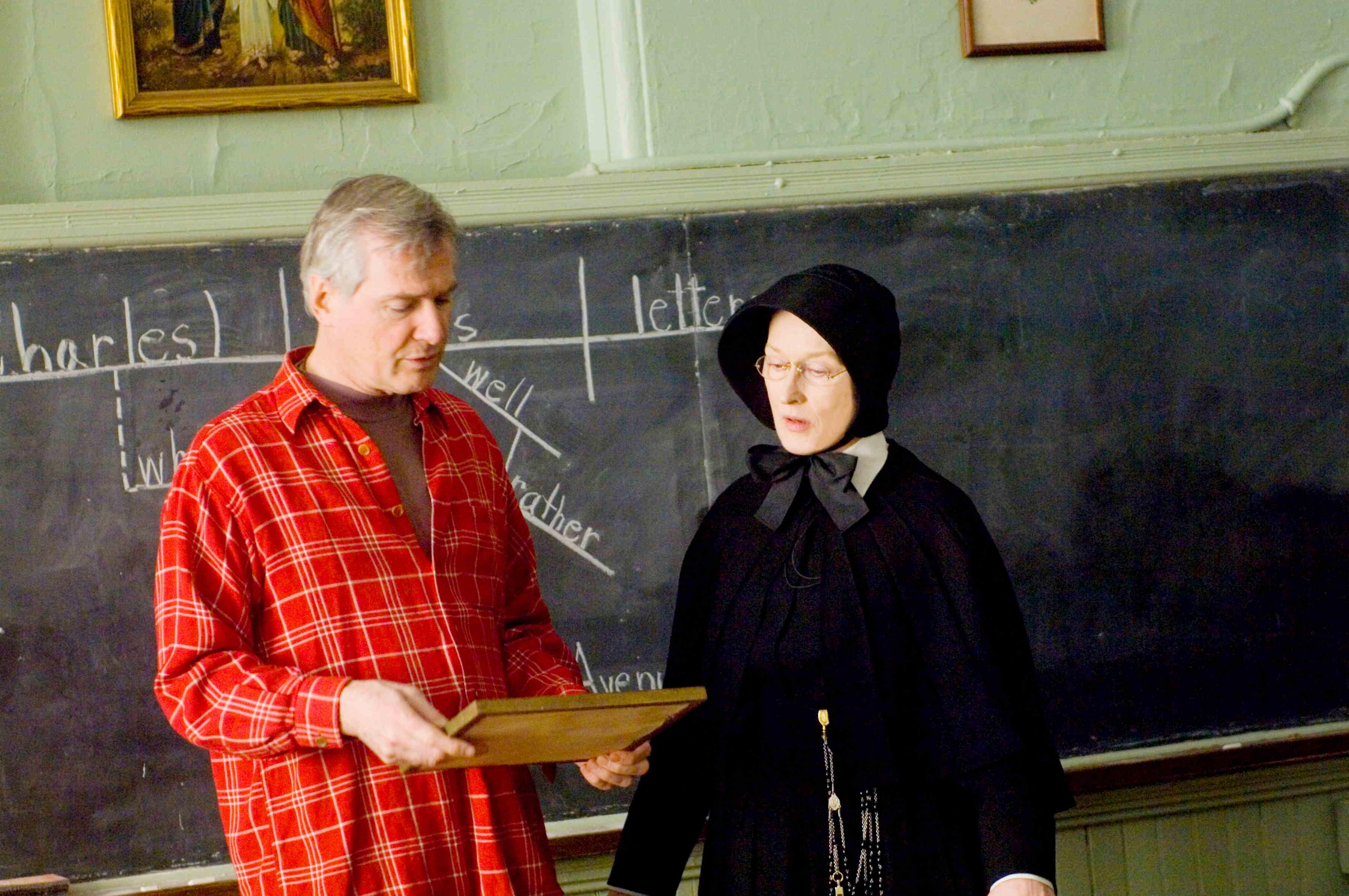 on the set with writer/director John Patrick Shanley
on the set with writer/director John Patrick Shanley
In its speculative and allegorical nature, Doubt offers a demanding assignment for its actors, who are required to propel the dramatic currents of a loaded scenario with exact and precise timing, constantly revealing and reacting to changes in their perceptions of other characters. Moreover, Shanley has also conceived his characters as symbolic embodiments of historically specific upheavals in the Catholic Church, namely the progressive reforms of the Pope’s Second Vatican Council and an early wave of sexual abuse accusations in the mid-1960s. Shanley’s characters are figureheads in a timeworn battle between modernity and conservatism, compassion and discipline, and the uncertainty and conviction inherent in faith. As Sister Aloysius, Streep must represent a strict and censorious strain of traditional Christianity while also leading her righteous, steadfast cause to expel perceived abuse. The film tramsits its allegiance to Sister Aloysius so flagrantly — Shanley and cinematographer Roger Deakins make sure to frame Flynn as an inviting yet ultimately guilt-ridden and dubious character — while also scorning her as a conniving and terrifying Mother Superior. Streep’s Aloysius becomes something of a moral monster, firmly maintaining her belief in Flynn’s misdeeds even as the filmmakers fashion her as a severe, almost gothic presence.
On a more tactical level, Streep has other hazards to conquer. She must rely entirely on the faculties of her face and the clipped visibility of her hands as her entire body remains cloaked in a full-length habit that scrunches her mug back like a plastic-wrapped lemon. She dons small, wiry glasses. Her Bronx accent, unstoppable in its pitch and range, doesn’t help us take seriously a characterization often prone to ridicule and caricature. Streep heavily leans into the theatricality of her role, abandoning subtlety as Adams has steadfastly abandoned her intellect, flamboyantly vanquishing anyone who dares to question or curtail Aloysius’ mission or challenge her authority. It’s thrilling, if not exactly edifying, to watch Streep and wonder just how far she will take any given moment. How much higher will she raise her voice, and to what decibel? How strenuously will she arch her brows or tighten her lips? How awkwardly will she rattle her stillness? In spite of the overall absurdity of her performance, there is immense pleasure to be found in Streep reacting as if Hoffman has configured a bomb when he requests not one, not two, but three cubes of sugar for his tea, or when she joylessly, even militantly shoots down Adams’ suggestion that the students sing “Frosty the Snowman” at the Christmas pageant.
 a wonderfully silly promo shot for a serious film
a wonderfully silly promo shot for a serious film
Do you share similar concerns or affection for Streep’s formidable, if limited, performance? Where do you see the actress making her own smart choices, and how else does Shanley sabotage his leading lady?
MATTHEW: Placing Streep on the same screen as Hoffman, the Konstantin to her Irina in Mike Nichols’ 2001 Shakespeare in the Park production of The Seagull and a rare Streep costar of equivalent mastery, should have easily resulted in some of the most commanding film acting in recent memory. But Streep is inhibited, like everyone on screen but Hoffman, by the rigid, portentous solemnity of Shanley’s directorial vision, with its endlessly canted angles of open windows and booming telephones, and his silly, Screenwriting 101 symbols. Streep is let down not only by her director, who seems to have spent half of his budget on wind and rain machines, but by Adams, an actress I wholeheartedly adore but who is pushed here towards radiant dullness, dredging up doe-eyed whimsy in all the wrong places and playing an unambiguous innocent rather than the murky co-conspirator that the script sets her up to be. Then again, very rarely in Doubt is our gaze drawn to anyone other than Streep.
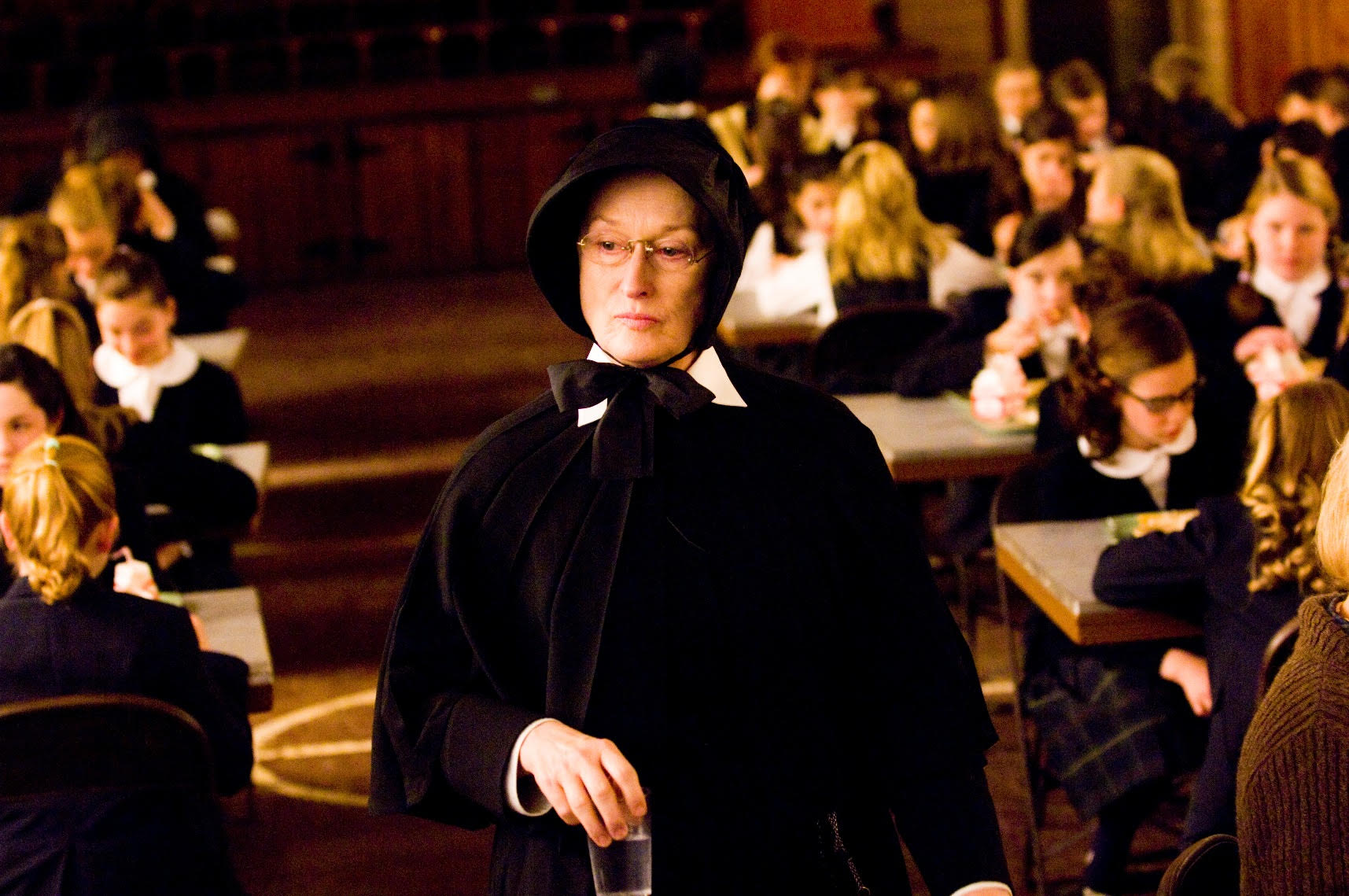
It’s clear from Aloysius’ star entrance, slinking down a church aisle during Sunday mass to snap a sleeping pupil out of his early morning stupor with God-fearing vehemence, that Streep is working from a heightened register befitting the theatrical origins of Shanley’s parable. Doubt premiered on Broadway in 2005 and quickly nabbed a slew of awards, many of them reserved for leading lady Cherry Jones, who might have worked wonders if permitted to reprise her stage triumph on the big screen. Streep is nonetheless inventive in her baroque approach, crafting a fully-realized physical identity for Aloysius, defined by a restless mouth which always seems to be either twitching, creasing, or pursing its lips, as well as those judgemental owl eyes that peer out from a perpetually taut and stern countenance. In her every frame, Streep evinces the cynical wisdom of a life spent in the service of the church. When Adams opens her mouth with a statement of cockeyed naïvete, the impatient, disbelieving coldness of Streep’s rejoinders could ice over every inch of the Grand Concourse. Streep’s Aloysius simply has little time for dimwitted distraction or personal deficiency, especially when it comes to the matter of the school’s first black student and the parish’s star priest, which the nun determines is a matter only she can settle. I love when Streep lets the beginning of a grin creep across her lips at the idea of being the cat called upon to catch the mouse in her house; it’s the rare note in Streep’s performance where we can see Aloysius palpably attracted to the role of avenging angel, even taking a sort of sadistic pleasure in this newfound calling.
Yet Streep’s instincts are far from unimpeachable, and the performance abounds with missed opportunities as Shanley’s plot thickens. Streep seldom allows herself to just be the character; her acting insists on calling attention to its own affects so that the acting itself takes precedence over the character’s crusade. The sheer flash of her style renders the characterization devoid of the emotional shadings that exemplify the very best of Streep’s other tour de forces, and the moments in which she decides to restrain her own intensity feel oddly misjudged. She clings to the ropes during her throwdown with Viola Davis, whose heavy moroseness and unspeakably strange compliance in her breakout role as Donald’s mother are utterly indelible. Streep’s decision to play a chastened listener rather than the fierce opponent we’ve seen prior to this is an admirable gesture of actorly generosity, one that paves the way for Davis’ psychologically complex feat, but it also diminishes what should by all means be an equal playing field. The scene could have certainly benefited from some more of the adamancy that Streep draws forth with volcanic might in the confines of the school.
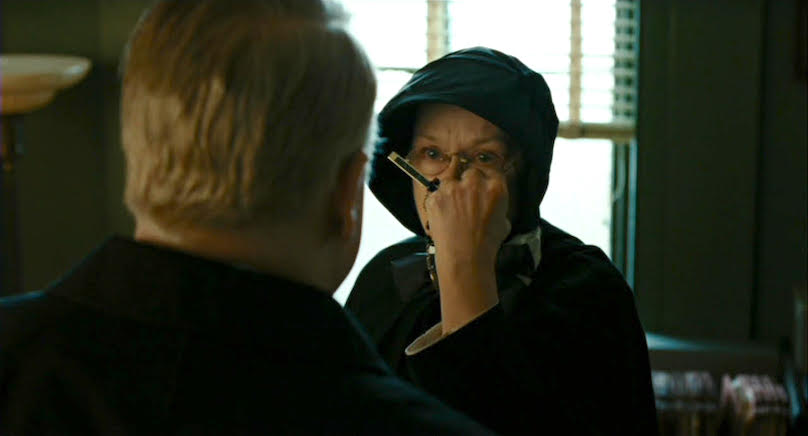
And yes, it can be momentarily exhilarating to watch Streep throw up the crucifix that is Aloysius’ shield with righteous, lunatic conviction in the face of Father Flynn’s cagey refusal to play by her rules or fervently bemoan the use of ballpoint pens in the classroom. (“Ballpoints make them press down, and when they press down, they write like monkeys,” she quite literally growls at Adams.) But choices like these don’t contain and thus cannot reveal the depths of motivation that the performance and the character live or die by.
It makes sense why actors, in particular, savored Streep’s approach in all its ostentatious, effortfully pronounced idiosyncrasies. (She claimed that year’s Screen Actors Guild Award for Best Actress.) But, to my mind, it’s Hoffman’s dapper embodiment, with its white-faced pseudo-sincerity and slick conviviality, that fares best of all in Doubt. Hoffman’s is a performance neither completely naturalistic nor fully mannered. Instead, the actor occupies an inspired middle-ground of stylized realism that enables us, the viewers, to find the stomach-churning ambiguities and open-ended questions integral to Shanley’s central mystery within the holes of Hoffman’s mercurial demeanor. This dearly-missed actor can match Streep’s room-shaking roar decibel for decibel, but his effects always arise from a complete human being who remains resolutely three-dimensional, even in spite of his accumulating enigmas. Streep’s effects, on the other hand, are a staggering smokescreen for inner intentions never made manifest. Her screams and swoops thrill in the way that only a true master of the craft can thrill, but they’re still only grandstanding parts of a performance made up of little more than grandstanding, a holy power with few flickers of any real holy spirit.
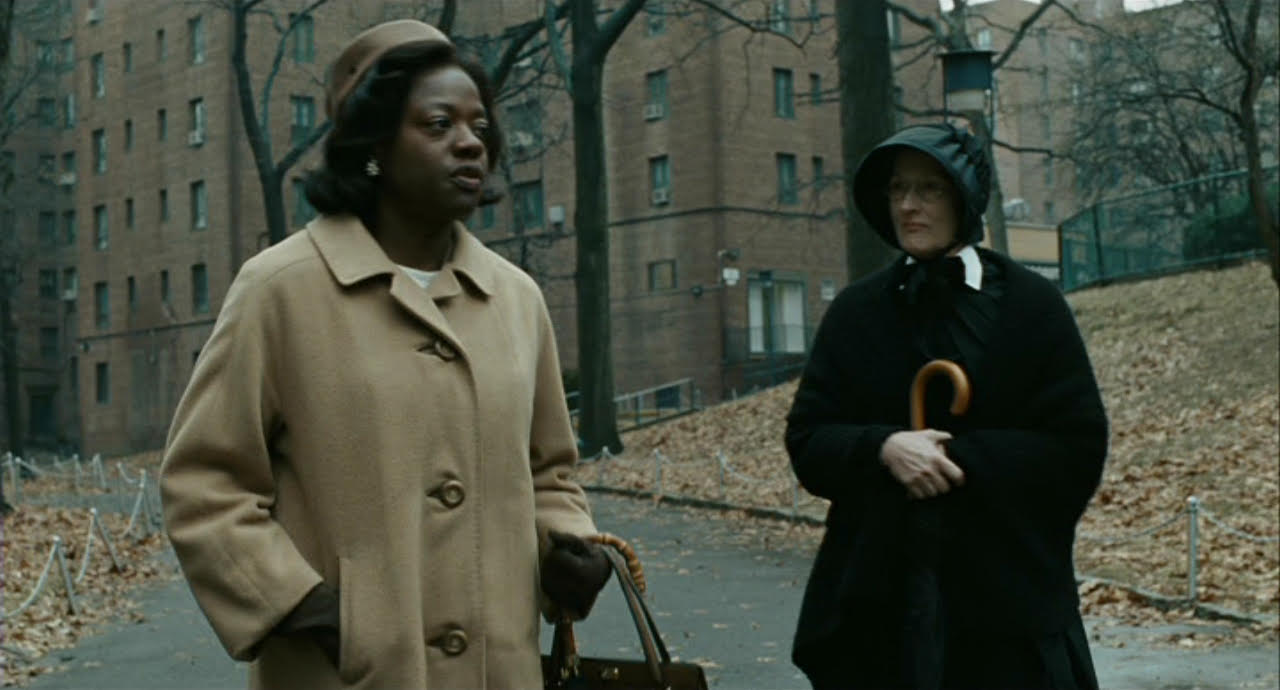
Catch up with 'Months of Meryl'
- Julia (1977)
- The Deer Hunter (1978)
- Manhattan (1979)
- The Seduction of Joe Tynan (1979)
- Kramer vs Kramer (1979)
- The French Lieutenant's Woman (1981)
- Still of the Night (1982)
- Sophie's Choice (1982)
- Silkwood (1983)
- Falling in Love (1984)
- Plenty (1985)
- Out of Africa (1985)
- Heartburn (1986)
- Ironweed (1987)
- A Cry in the Dark (1988)
- She-Devil (1989)
- Postcards from the Edge (1990)
- Defending Your Life (1991)
- Death Becomes Her (1992)
- The House of the Spirits (1993)
- The River Wild (1994)
- The Bridges of Madison County (1995)
- Before and After (1996)
- Marvin's Room (1996)
- Dancing at Lughnasa (1998)
- One True Thing (1998)
- Music of the Heart (1999)
- Adaptation (2002)
- The Hours (2002)
- The Manchurian Candidate (2004)
- Lemony Snicket's A Series of Unfortunate Events (2004)
- Prime (2005)
- A Prairie Home Companion (2006)
- The Devil Wears Prada (2006)
- Dark Matter (2007)
- Evening (2007)
- Rendition (2007)
- Lions for Lambs (2007)
- Mamma Mia! (2008)